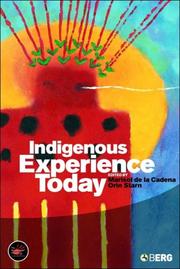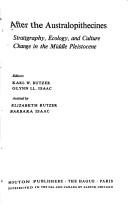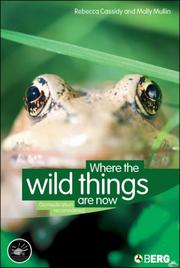| Listing 1 - 9 of 9 |
Sort by
|
Periodical
ISSN: 00113204 15375382 Year: 1960 Publisher: Chicago, Ill. : University of Chicago Press
Abstract | Keywords | Export | Availability | Bookmark
 Loading...
Loading...Choose an application
- Reference Manager
- EndNote
- RefWorks (Direct export to RefWorks)
Current Anthropology is a transnational journal devoted to research on humankind, encompassing the full range of anthropological scholarship on human cultures and on the human and other primate species. Communicating across the subfields, the journal features papers in a wide variety of areas, including social, cultural, and physical anthropology as well as ethnology and ethnohistory, archaeology and prehistory, folklore, and linguistics.
Biological anthropology. Palaeoanthropology --- Ethnology. Cultural anthropology --- Anthropology --- Anthropologie --- Periodicals --- Périodiques --- Offprints --- 39 <05> --- #TS:WAAR --- Volkenkunde. Zeden en gebruiken. Culturele antropologie--Tijdschriften --- Arts and Humanities --- General and Others --- History --- Language & Linguistics --- Society and Culture --- Archaeology --- Social Sciences --- Archeology --- Arts and Humanities. --- Archaeology. --- Social Sciences. --- 39 <05> Volkenkunde. Zeden en gebruiken. Culturele antropologie--Tijdschriften --- Périodiques --- EJANTHR EPUB-ALPHA-C EPUB-PER-FT JSTOR-E UNICHIPRE-E --- Antropologia. --- Anthropology. --- Human beings --- Anthropology - Periodicals --- Primitive societies --- Antropologia
Book
Year: 1961 Publisher: New York Wenner-Gren Foundation
Abstract | Keywords | Export | Availability | Bookmark
 Loading...
Loading...Choose an application
- Reference Manager
- EndNote
- RefWorks (Direct export to RefWorks)

ISBN: 9781845205195 1845205197 9781845205188 1845205189 9781003085690 1003085695 9781000187069 1000187063 9781000190182 1000190188 9781000183559 1000183556 9781847883377 1474214932 1282473689 9786612473685 1847883370 9781282473683 9781474214933 6612473681 Year: 2007 Publisher: Oxford ; New York : Berg,
Abstract | Keywords | Export | Availability | Bookmark
 Loading...
Loading...Choose an application
- Reference Manager
- EndNote
- RefWorks (Direct export to RefWorks)
A century ago, the idea of indigenous people as an active force in the contemporary world was unthinkable. It was assumed that native societies everywhere would be swept away by the forward march of the West and its own peculiar brand of progress and civilization. Nothing could be further from the truth. Indigenous social movements wield new power, and groups as diverse as Australian Aborigines, Ecuadorian Quichuas, and New Zealand Maoris, have found their own distinctive and assertive ways of living in the present world. Indigenous Experience Today draws together essays by prominent scholars in anthropology and other fields examining the varied face of indigenous politics in Bolivia, Botswana, Canada, Chile, China, Indonesia, and the United States, amongst others. The book challenges accepted notions of indigeneity as it examines the transnational dynamics of contemporary native culture and politics around the world.
Indigenous peoples --- Culture and globalization. --- Autochtones --- Culture et mondialisation --- Social conditions. --- Government relations. --- Conditions sociales --- Relations avec l'Etat --- Culture and globalization --- Social conditions --- Government relations --- Indigenous peoples - Social conditions --- Indigenous peoples - Government relations --- Globalization and culture --- Globalization --- Ethnology
Book
ISBN: 0198573529 9780198573524 Year: 1972 Publisher: Oxford: Clarendon,
Abstract | Keywords | Export | Availability | Bookmark
 Loading...
Loading...Choose an application
- Reference Manager
- EndNote
- RefWorks (Direct export to RefWorks)
Physical anthropology --- Human population genetics --- Methodology --- Geografie --- Sociale geografie --- Bevolking. --- Human population genetics. --- Methodology. --- Physical anthropology - Methodology

ISBN: 9027976295 0202330745 3111779807 3110878836 9783110878837 9789027976291 9780202330747 Year: 1975 Publisher: The Hague : Mouton,
Abstract | Keywords | Export | Availability | Bookmark
 Loading...
Loading...Choose an application
- Reference Manager
- EndNote
- RefWorks (Direct export to RefWorks)
No detailed description available for "After the Australopithecines".
Geology, Stratigraphic --- Paleontology --- Ice Age --- Pleistocene Epoch --- Glacial epoch
Book
ISBN: 3110862859 9783110862850 Year: 1969 Publisher: Hague : Mouton,
Abstract | Keywords | Export | Availability | Bookmark
 Loading...
Loading...Choose an application
- Reference Manager
- EndNote
- RefWorks (Direct export to RefWorks)
No detailed description available for "Approaches to Animal Communication".
Animal communication. --- Animal behavior. --- Animals --- Animals, Habits and behavior of --- Behavior, Animal --- Ethology --- Animal psychology --- Zoology --- Ethologists --- Psychology, Comparative --- Animal biocommunication --- Animal language --- Biocommunication, Animal --- Language learning by animals --- Animal behavior --- Behavior

ISBN: 100308737X 1000189880 100308737X 1000183254 1474215955 1282473638 9786612473630 184788332X 9781847883322 9781845201524 9781847883322 1845201523 9781845201531 1845201531 Year: 2007 Publisher: Oxford ; New York : Berg,
Abstract | Keywords | Export | Availability | Bookmark
 Loading...
Loading...Choose an application
- Reference Manager
- EndNote
- RefWorks (Direct export to RefWorks)
Domestication has often seemed a matter of the distant past, a series of distinct events involving humans and other species that took place long ago. Today, as genetic manipulation continues to break new barriers in scientific and medical research, we appear to be entering an age of biological control. Are we also writing a new chapter in the history of domestication? Where the Wild Things Are Now explores the relevance of domestication for anthropologists and scholars in related fields who are concerned with understanding ongoing change in processes affecting humans as well as other species. From the pet food industry and its critics to salmon farming in Tasmania, the protection of endangered species in Vietnam and the pigeon fanciers who influenced Darwin, Where the Wild Things Are Now provides an urgently needed re-examination of the concept of domestication against the shifting background of relationships between humans, animals and plants.
Domestication --- Domestic animals --- Plants, Cultivated --- Human-animal relationships --- Human-plant relationships
Book
ISBN: 0198571208 0198571178 9780198571209 Year: 1972 Publisher: Oxford: Clarendon press,
Abstract | Keywords | Export | Availability | Bookmark
 Loading...
Loading...Choose an application
- Reference Manager
- EndNote
- RefWorks (Direct export to RefWorks)
Human population genetics --- Population. --- Demography. --- Human population genetics. --- Demography --- Geografie --- Human genetics --- Sociale geografie --- Bevolking. --- Addresses, essays, lectures. --- Écologie humaine --- Écologie humaine --- Population
Book

ISBN: 9783111718101 Year: 2011 Publisher: Berlin Boston
Abstract | Keywords | Export | Availability | Bookmark
 Loading...
Loading...Choose an application
- Reference Manager
- EndNote
- RefWorks (Direct export to RefWorks)
| Listing 1 - 9 of 9 |
Sort by
|

 Search
Search Feedback
Feedback About UniCat
About UniCat  Help
Help News
News